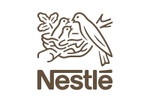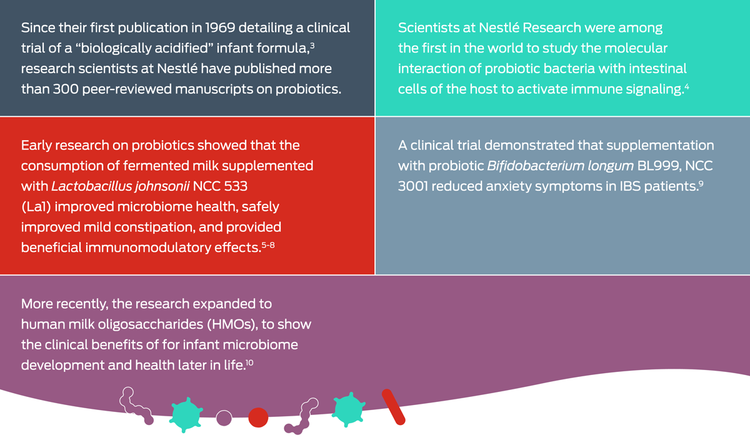

As part of Nestlé, Purina draws on the unequaled culture collection and decades of microbiome, prebiotic and probiotic research to evaluate potential probiotic strains of value to veterinary medicine and pet health.
Nestlé has been collecting bacterial strains since the 1970s. The Nestlé Culture Collection (NCC), housed in Lausanne, Switzerland, contains thousands of bacterial strains that have been genetically sequenced and cataloged.
Nestlé published the first Bifidobacterium species genome sequence as well as the first Lactobacillus species sequenced from the human gut.1,2

Purina and Nestlé scientists collaborated on the first direct comparison of the dog and human microbiomes. This was the first study to demonstrate the similarity between the microbiomes of the two species as well as the similarity in their responses to diet.11,12
Purina was the first to offer a shelf-stable probiotic supplement proven to promote a healthy immune system and provide dietary management of dogs or cats with diarrhea. This probiotic, a specific strain of Enterococcus faecium called E. faecium SF68 (NCIMB 10415 4b1705), remains the most studied probiotic in veterinary medicine based on publications to date. Purina was also the first to offer a shelf-stable probiotic (Bifidobacterium longum BL999, NCC 3001) proven to reduce some anxious behaviors and help dogs cope with external stressors. In addition to product development-focused research, Purina performs and funds research that advances scientific knowledge of the microbiome health and the impact of nutrition.

Nestlé Nutrition Institute
The Nestlé Nutrition Institute is a not-for-profit association established in 1981 with the goal to advance the science of nutrition. Visit their website for more information and resources.

Canine & Feline Microbiome: Groundbreaking Nutritional Science from Purina
This document provides summaries of published Purina science related to the microbiome.

More than a Meal: Putting Purina’s Microbiome Science into Practice
This document presents Purina’s published microbiome science into clinical context for veterinarians.
Explore other areas of the Microbiome Forum
Find out more
- Schell, M. A., Karmirantzou, M., Snel, B., Vilanova, D., Berger, B., Pessi, G.,…Arigoni, F. (2002). The genome sequence of Bifidobacterium longum reflects its adaptation to the human gastrointestinal tract. Proceedings of the National Academy of Sciences of the United States of America (PNAS), 99(22), 14422–14427.
- Pridmore, R. D., Berger, B., Desiere, F., Vilanova, D., Barretto, C., Pittet, A.-C.,…Schell, M. A. (2004). The genome sequence of the probiotic intestinal bacterium Lactobacillus johnsonii NCC 533. Proceedings of the National Academy of Sciences of the United States of America, 101(8), 2512–2517. doi:10.1073/pnas.0307327101
- Grieder, H. R. (1969). Clinical trials on a new biologically acidified formula. Praxis, 39, 1236–1238.
- Mathias, A., Duc, M., Favre, L., Benyacoub, J., Blum, S., & Corthésy, B. (2010). Potentiation of polarized intestinal caco-2 cell responsiveness to probiotics complexed with secretory IgA. Journal of Biological Chemistry, 285(44), 33906–33913.
- Yamano, T., Iino, H., Takada, M., Blum, S., Rochat, F., & Fukushima, Y. (2006). Improvement of the human intestinal flora by ingestion of the probiotic strain Lactobacillus johnsonii La1. British Journal of Nutrition, 95, 303–312.
- Fukushima, Y., Yamano, T., Kusano, A., Takada, M., Amano, M., & Iino, H. (2004). Effect of fermented milk containing Lactobacillus johnsonii La1 (LC1®) on defecation in health Japanese adults – A double blind placebo controlled study. Bioscience Microflora, 23(4), 139–147.
- Schiffrin, E. J., Rochat, F., Link-Amster, H., Aeschlimann, J. M., & Donnet-Hughes, A. (1995). Immunomodulation of human blood cells following the ingestion of lactic acid bacteria. Journal of Dairy Science, 78(3), 491–497.
- Schiffrin, E. J., Brassart, D., Servin, A. L., Rochat, F., & Donnet-Hughes, A. (1997) Immune modulation of blood leukocytes in humans by lactic acid bacteria: criteria for strain selection. American Journal of Clinical Nutrition, 66, 515S–520S.
- Pinto-Sanchez, M. I., Hall, G. B., Ghajar, K., Nardelli, A., Bolino, C., Lau, J. T.,…Bercik, P. (2017). Probiotic Bifidobacterium longum NCC3001 reduces depression scores and alters brain activity: A pilot study in patients with irritable bowel syndrome. Gastroenterology, 153, 448–459. doi:10.1053/ j.gastro.2017.05.003
- Berger, B., Porta, N., Foata, F., Grathwohl, D., Delley, M., Moine, D.,…Sprenger, N. (2020). Linking human milk oligosaccharides, infant fecal community types, and later risk to require antibiotics. mBio, 11(2), e03196–19. doi:10.1128/mBio.03196-19
- Coelho, L. P., Kultima, J. R., Costea, P. I., Fournier, C., Pan, Y., Czarnecki-Maulden, G.,…Bork, P. (2018). Similarity of the dog and human gut microbiomes in gene content and response to diet. Microbiome, 6(72). doi:10.1186/S40168-018-0459-3
- Li, Q., Lauber, C. L., Czarnecki-Maulden, G., Pan, Y., & Hannah, S. S. (2017). Effects of the dietary protein and carbohydrate ratio on gut microbiomes in dogs of different body conditions. mBio, 8(1), e01703–16. doi:10.1128/mBio.01703-16

